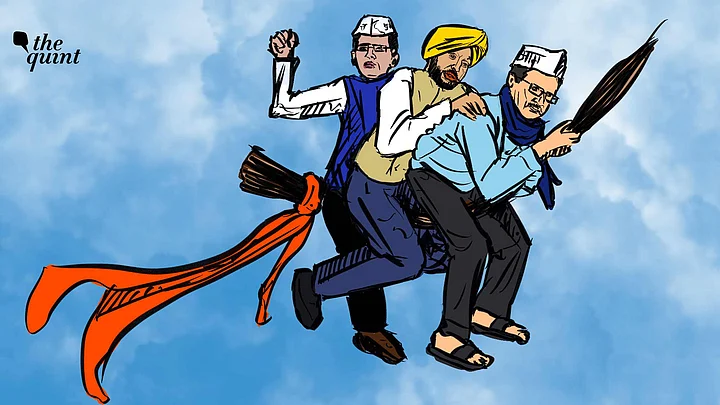The results for five state assembly elections are out and Arvind Kejriwal's Aam Aadmi Party (AAP) has clearly emerged as the biggest winner despite the BJP retaining power in 4 out of these 5 states including Uttar Pradesh — one of India's biggest, most important and politically complex battleground.
AAP decimated the Congress in Punjab by winning 92 out of 117 assembly constituencies. Never before has any party won these many seats in Punjab assembly since the state's reorganisation in 1966.
While several factors worked to AAP's advantage, its victory is being attributed to a massive anti-incumbency against traditional players in the state politics with people on ground having voted for "change". People are also lauding the party for a clear and focused campaign highlighting important issues like unemployment, corruption, inflation, education, and healthcare.
It is, however, pertinent to look at another aspect of AAP's campaign in Punjab — the party's alleged soft Hindutva politics — which gives us an insight into its national ambitions and ideological positioning.
This is crucial vis-a-vis its preparations for the state assembly elections in Himachal Pradesh and Gujarat, and eventually for the 2024 general elections.
Kejriwal's Soft-Hindutva: Footnotes From Punjab
As BJP's saffron politics pivoted on its narrative of Hindutva remains fashionable in states like Uttar Pradesh, Madhya Pradesh, Uttarakhand, Haryana, Gujarat, Karnataka, and many others, Punjab has managed to become an exception with few takers for the communal Hindu Vs Muslim narrative.
In the run-up to the 2022 assembly elections the BJP carefully tested waters for its Hindutva agenda in Hindu-dominated pockets of Amritsar, Jalandhar, Fazilka, Rajpura, Pathankot, and Hoshiarpur. Slogans like “Jo Ram ko laye hai, hum unko layenge, Punjab mein hum fir se, bhagwa fehrayenge" and "Ayodhya bas jhaanki hai, kashi abhi baaki hai", were raised and issues of Kashmir, national security, were the major planks for the saffron party which does not enjoy much popularity in the state.
Interestingly, even though the unpopularity of communal and right-wing politics in Punjab was never a guarded secret, the Aam Aadmi Party still did not shy away from using a few tactics from BJP's playbook.
Arvind Kejriwal, on 15 February, five days before the state went to polls said that the breach in prime minister Narendra Modi's security has Hindus and traders in the state worried. "After the Prime Minister’s security lapse, Hindus and traders in Punjab are worried. They have fears about internal security," he said.
Earlier in December, AAP had carried out a Tiranga Yatra in parts of Jalandhar which Kejriwal said would be "carried out in an atmosphere of patriotism amid chants of Bharat mata ki jai."
Throughout the campaign, AAP functionaries regularly raised issues related to Indo-Pak border security, and drone threats. In November 2021, party's national spokesperson and Punjab state co-incharge Raghav Chaddha cast a shadow on Punjab Congress chief Navjot Singh Sidhu addressing Pakistan Prime Minister Imran Khan as his "big brother".
"Deeply worrying that Punjab's ruling party chief and Chief Minister are professing their love for Pakistan and its prime minister," Chaddha told news agency ANI.
To be fair, even the Congress did the same with its leaders like Rahul Gandhi accusing AAP of having terrorist links.
The New Ideological Centre in Indian Politics
The overwhelming mandate for Aam Aadmi Party in Punjab is in one way also an acceptance of their soft-Hindutva politics where a party can focus its campaign on development and civic issues while raising the 'Hindu khatre mein hai' pitch.
It must be noted that the state of Punjab which was at the epicentre of post-partition violence in 1947, rejected BJP's Hindutva politics even during the 2014 and 2019 parliamentary elections.
The entry of AAP in the state, however, marks a significant shift in its political order where Arvind Kejriwal and Bhagwant Mann will not only try to emulate the "Delhi model" of governance but also the Delhi model of social and political order where Hindutva is a way of life.
As part of this Delhi model, AAP has successfully positioned Arvind Kejriwal as a devout Hindu who pays homage to Ram Lalla in Ayodhya, asks 2 crore Delhiites to perform Diwali Puja, wants Hindu elderly to visit Ayodhya for Ram Lalla's darshan, and stays silent as his government holds the Tablighi Jamat responsible for spike in COVID cases in the national capital.
And as AAP eyes the political space occupied by the Congress party as India's prime opposition, it also is changing the definition of India's political Centre.
While the Congress has largely positioned itself as a party of all communities, AAP is placing itself as a party which supports development and welfare of all but most importantly of the Hindus.
This is evident from their operations in Delhi, and campaigns in Punjab, Uttarakhand, and Goa — states where they've won and made significant inroads at the expense of the Congress party. While in Uttarakhand Kejriwal promised a "deshbhakt fauji chief minister", in Goa they banked on their "Hindu-friendly" image as opposed to the Congress party or Mamata Banerjee's Trinamool Congress (TMC).
While how AAP performs and keeps its pre-poll promises in Punjab remains to be seen, it is clear that the AAP's ideological positioning is here to stay as Arvind Kejriwal nationally positions himself as the chief opposition to Narendra Modi-led Bharatiya Janata Party (BJP).
